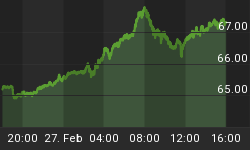We're living in interesting times. A popular TV program called "Deal or No Deal" - a high-stakes game show of odds and chance - says it all. On the show, contestants compete for cash inside 26 sealed briefcases. The show is exciting because so many contestants take very big risks and at each stage they are offered a "Deal" of a certain free winning or "No Deal", which means they risk it all for a chance to win even more. The critical thing to realize here is that the contestants can only win because their own money is never at risk. This show is a sign of the times and parallels the mentality of many money managers and financial institutions.
Deal or No Deal is, indeed, a study in human nature and has great bearing on more than a few hedge funds, financing institutions and companies. The message here is that there are too many people willing to make extraordinarily risky bets with other people's money if they personally have a chance to win big.
Many hedge funds collect two percent for assets under management, and 20 percent of any winnings, but they do not offer a "claw-back" clause in their agreements. If a claw-back clause existed, investors in a hedge fund would be able to take back the previous winnings of their asset managers if too much of the hedge fund's money they managed was gambled away foolishly. When financial interests aren't clearly aligned, a trader can literally bet the bank.
The recent Amaranth Fund story is just one example where a 32-year old "kid" bet tens of billions of investor dollars and lost $6 billion. Think about it. What lunatic pension, endowment or advisor, would trust billions to someone who has barely lived through one economic cycle, or was just a child when Nelson Bunker Hunt and his brother lost everything on March 27, 1980 on "Silver Thursday". When the Hunt brothers began accumulating silver in 1973 the price was $1.95 per ounce. Early in 1979 the price was about $5, and in 1980 the price peaked at $49.45 per ounce, but the highly leveraged brothers were eventually unable to meet margin calls and the price of silver plummeted from $21.62 to $10.80. They were forced to file for bankruptcy. Surprise! Natural Gas and Silver are both commodities, and speculating with high leverage in them is dangerous!
The memories of today's young asset managers are so short that they can't even remember when 28-year old Nick Lesson blew up the Baring Investment Bank, a 233 year-old institution, or when Long Term Capital collapsed and folded in 1998 when it lost $4.6 billion in less than four months. Even after going through the 2000 stock market crash, the financial markets today are still running without adult supervision. I'm placing my bets that Amaranth is not the last giant hedge fund disaster to play out.
The real risks to the market are not in the tens of billions of dollars that can be lost in highly-leveraged commodity futures, but in the hundreds of billions that can change hands now that total derivatives are around $270 trillion, and credit default swaps are over $23 Trillion.
In the credit default swap market, a hedge fund or a firm like JP Morgan or Goldman Sachs can collect cash payments today, with a promise to pay tomorrow if a bond or note defaults. Wall Street traders and hedge fund managers take the credit default swap premiums into income and assume that low volatility and low loss will run forever. The mentality on Wall Street is still all about making a year-end bonus big enough to retire. Do the traders and money managers really care that they are gambling pension, endowment or shareholder money? Are they overly concerned if the losses pile up in housing, bonds, or corporate credits? As an investor, do you care?
Everywhere we look there are massive experiments in moral hazard where decision makers get to reward themselves over and over again. Accounting frauds, such as Enron, are in the headlines every day and back-dating options for corporate management has now been discovered at hundreds of firms. Corporate executives, money managers and traders, who get to measure their own performance, are putting their hands into your cookie jar and grabbing as many cookies as they can.
Low market volatility and credit spreads indicate that the markets perceive credit risk to be minimal. However, risk appears low only because the growth of derivatives, such as credit default swaps, has been exponential. All the hedge funds and major Wall Street players have been selling volatility and credit default swaps - especially credit default swaps on mortgages to buyers collecting far too few premiums to insure the risks. The retired Chairman of the Fed also assured us that the growth in derivatives lessens risk. Sadly, the same retired Chairman was on record just a few short years ago urging individuals to take out adjustable-rate mortgages when there was an incumbent President to re-elect and an economy to jump start.
Given human nature, the real risk in the markets is not just whether a stock goes up or down, but rather in the behavior of your asset manager. Investors beware! It's time to go back to only risking the money you can afford to lose, otherwise someone may already be playing Deal or No Deal with your money.















